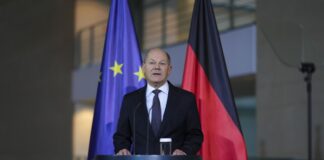
Libyan foreign minister Najla al-Mangoush has been suspended, following the announcement of a meeting last week with his Israeli counterpart which provoked demonstrations in Tripoli and other Libyan cities.
 ADVERTISEMENT
ADVERTISEMENTAn “administrative investigation” by a commission chaired by the Minister of Justice has been launched, according to Libyan Prime Minister Abdelhamid Dbeibah’s government.
On Sunday, Israeli Foreign Minister Eli Cohen revealed he had held “unprecedented” talks with his Libyan counterpart in Rome last week.
“I spoke with the foreign minister about the great potential of relations between the two countries,” Cohen was quoted as saying in a statement from his office.
“What happened in Rome was a chance and unofficial meeting… which did not involve any discussion, agreement or consultation”, reacted the Libyan Foreign Ministry in a statement.
Mangoush reiterated “in a clear and unambiguous manner Libya’s position with regard to the Palestinian cause”, it added, maintaining the minister had “refused to hold talks with any party representing the Israeli entity” and “remained categorically firm on this position”.
The Libyan ministry also denounced the “exploitation by the Hebrew and international media” of this “incident”, which they are trying to present as “a meeting or talks”.
Libya, which has been plunged into chaos since the fall of Muammar Gaddafi’s regime in 2011, does not maintain diplomatic relations with Israel.
Following Israel’s announcement of the meeting, the Libyan Presidential Council (PC), a body with certain executive powers, demanded clarification from the government.
The Israeli minister said he discussed with Mrs Mangoush “the importance of preserving the heritage of Libyan Judaism by repairing the synagogues and Jewish cemeteries in that country”.
This is a “first step in relations between Israel and Libya”, he continued, feeling that “Libya’s size and strategic position offer a huge opportunity for the State of Israel”.
The meeting took place under the auspices of Italian Foreign Minister Antonio Tajani, according to the Israeli press release.
 ADVERTISEMENT
ADVERTISEMENTMost of Libya’s Jewish population left the country in the 20 years following the Second World War, mainly going to Israel.
A few hundred Jews were still living in Libya at the time of Muammar Gaddafi’s coup d’état in 1969. He then expelled them, confiscated their property and destroyed their synagogues.
In recent years, Israel has normalised its relations with certain Arab nations under the Abraham Accords. However, the current policies of Benjamin Netanyahu’s government have been criticised by Arab countries.
Spontaneous protests broke out on Sunday in Tripoli and several of the capital’s suburbs as a sign of rejection of normalisation with Israel, before spreading to other cities where young people cut off roads, burnt tyres and waved the Palestinian flag.





